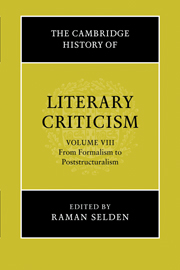Book contents
- Frontmatter
- Introduction
- 1 Russian Formalism
- STRUCTURALISM: ITS RISE, INFLUENCE AND AFTERMATH
- READER-ORIENTED THEORIES OF INTERPRETATION
- 9 Hermeneutics
- 10 Phenomenology
- 11 Reception theory: School of Constance
- 12 Speech act theory and literary studies
- 13 Other reader-oriented theories
- Bibliography
- Index
- References
10 - Phenomenology
from READER-ORIENTED THEORIES OF INTERPRETATION
Published online by Cambridge University Press: 28 March 2008
- Frontmatter
- Introduction
- 1 Russian Formalism
- STRUCTURALISM: ITS RISE, INFLUENCE AND AFTERMATH
- READER-ORIENTED THEORIES OF INTERPRETATION
- 9 Hermeneutics
- 10 Phenomenology
- 11 Reception theory: School of Constance
- 12 Speech act theory and literary studies
- 13 Other reader-oriented theories
- Bibliography
- Index
- References
Summary
Introduction
‘Phenomenology’ is usually used to designate a major movement in twentieth-century philosophy. The word itself stems from the Greek verb ‘phaino’ meaning ‘to bring to light’ or ‘to make to appear’, and has the literal meaning of ‘science of appearances’. It was first used by the German philosopher Johann Heinrich Lambert (1728–1777) in his Neues Organon (1764); Lambert, however, considered phenomena to be illusions and thus his notion of phenomenology was a science of illusions. Immanuel Kant (1724–1804) employs the word in his natural philosophy to distinguish the study of the realm of appearances for us (phenomena) from the study of the realm of essences or things as they are in themselves (noumena). In Hegel's (1770–1831) philosophy, which denies this Kantian division, phenomenology refers to different appearances of consciousness; the Phenomenology of Mind (1807) describes the various stages of human consciousness as it comes to complete awareness of itself. Later in the nineteenth century, particularly in the writings of Eduard von Hartmann (1842–1906) and C. S. Peirce (1839–1914), the term becomes associated with the study of facts or things as they really are. Only in the early part of the twentieth century, however, in the writings of Edmund Husserl (1859–1938) did phenomenology become a designation for a philosophical school. Today the term is usually identified with Husserl, his students, or the various philosophers who were influenced by Husserl's work. In discussions of literature two distinct tendencies emanate from phenomenology. and poetics, was developed centrally by Husserl's own students, especially the Polish phenomenologist Roman Ingarden (1895-1970); the other, a more practical direction involving literary criticism, is associated with the work of the Geneva School in the middle of the century.
- Type
- Chapter
- Information
- The Cambridge History of Literary Criticism , pp. 289 - 318Publisher: Cambridge University PressPrint publication year: 1995
References
- 1
- Cited by



